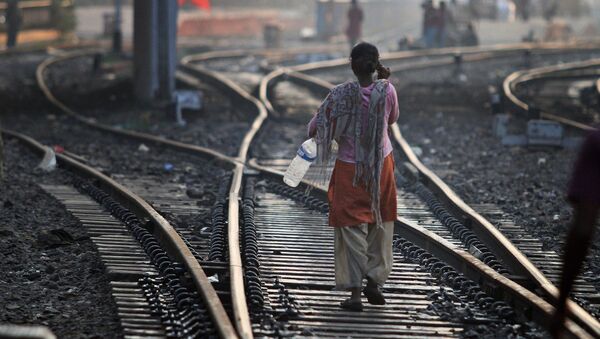MOSCOW, November 19 (Sputnik) — Some 2.5 billion people around the world lack access to basic sanitation, which has negative implications on the likelihood of achieving the 2015 Millennium Development Goals (MDG's), the World Health Organization (WHO) said in a report Wednesday.
"Safe and sufficient drinking-water, along with adequate sanitation and hygiene have implications across all Millennium Development Goals (MDGs)," the report published on the organization's website stated.
"2.5 billion people lack access to improved sanitation …, 748 million people lack access to improved drinking-water and it is estimated that 1.8 billion people use a source of drinking-water that is fecally contaminated," the report said.
The MDG's are set by the United Nations and member states, and intend to eradicate poverty and hunger, reduce child mortality, improve maternal health, combat infectious diseases and ensure environmental sustainability by 2015.
The report found that lack of water, sanitation and hygiene (WASH) facilitated the spread of diseases and illnesses such as diarrhea, cholera and typhoid. These diseases in turn led particularly to increased mortality in children under 5 and therefore a big step backwards in achieving the MDG's aims.
"In 2012, 6.6 million children under 5 died, compared with 12.6 million in 1990. Despite this improvement, the world is unlikely to achieve the MDG target of a two-thirds reduction in 1990 mortality levels by the year 2015," the WHO said in a separate statement on the MDG's.
The big gap in access to WASH with regards to the MDG's does not come without significant achievements. About 2.3 billion people gained access to improved drinking water between 1990 and 2012, as stated in the report.
The number of children dying from diarrheal diseases has also reduced from 1.5 million in 1990 to slightly over 600,000 in 2012.
Despite the progress made, the WHO noted that there is a major financial gap, particularly in rural areas, and encourages governments and donors to be more strategic "in implementing sustainable programmes to ensure equitable access to water and sanitation for all people."
The WHO working with the United Nations Water agency surveyed 94 countries to compile this biyearly report titled "The UN-Water Global Analysis and Assessment of Sanitation and Drinking-Water (GLAAS 2014)".



